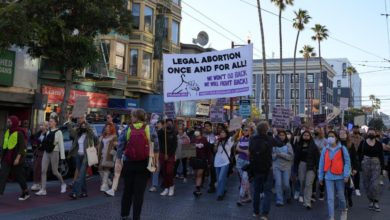![Protest after death of Sarita Halappanavar. Photo: William Murphy from Dublin, Ireland [CC BY-SA 2.0 (https://creativecommons.org/licenses/by-sa/2.0)], via Wikimedia Commons](https://www.liberationnews.org/wp-content/uploads/2018/05/Dublin_Savita_Halappanavar_Rally_121-300x200.jpg)
The people of Ireland took to the polls on May 25 to cast their historic vote to whether to repeal the Eighth Amendment, which placed the life of a pregnant woman and a fetus on equal footing and effectively bans abortion. After many long and suspenseful months of campaigning by political parties and other grassroots coalitions such as Together for Yes, progressive forces succeeded and won a major victory.
The Eighth Amendment of the Constitution of Ireland was adopted in September of 1983 during the Fine Gael-Labour Party coalition government and was suggested previously by the more right-wing Fianna Fáil government. The Eighth Amendment explicitly stated: “The State acknowledges the right to life of the unborn and, with due regard to the equal right to life of the mother, guarantees in its laws to respect, and, as far as practicable, by its laws to defend and vindicate that right.” The bill was heavily campaigned by members of the Catholic Church, right-wing groups, and pro-life groups and passed with 66.90 percent voting yes to adopt the bill and 33.10 percent voting no. As a result of Eighth Amendment, the “destruction of of unborn life” became a crime and was punishable by up to 14 years in prison.
Since 1983, there have been numerous campaigns to repeal the Eighth Amendment and grant women control over their own bodies, but none have fully succeeded. In 1992, a Supreme Court judgment, known as the “X case,” granted the right to an abortion under certain circumstances in which pregnancy endangers a woman’s life, including risk of suicide, although this still did not grant women full autonomy over their bodies.
The death of Savita Halappanavar
Savita Halappanavar was a 31-year old Indian woman living in ireland who at the time of her death was 17-weeks pregnant. Halappanavar died due to problems resulting from a septic miscarriage after being hospitalized for seven days at University Hospital Galway. Early on in the process, she requested an abortion but was denied by medical staff because they felt her life was not in immediate danger. Eventually, doctors did determine her life was in danger and attempted to induce delivery, though the sepsis continued to develop and she died of cardiac arrest.
Her death caused outrage in Ireland and internationally. Numerous marches and protests took place. Organizers and community members were angry and stated that she died because of the lack of specific guidance on access to a legal abortion as outlined in the X case. Halappanavar’s death urgently prompted a new act to be put in place called the “Protection of Life During Pregnancy Act 2013” which defined the circumstances in which an abortion can be performed to ensure the safety of a woman.
>Repeal the Eighth
As of May 25, the Eighth Amendment of the Constitution of Ireland has been repealed and replaced with the new Thirty-Sixth Amendment which states: “Provision may be made by law for the regulation of termination of pregnancy.”
The repeal passed with a landslide with 66.40 percent voting yes to repeal the Eighth and 33.60 percent voting no. The overall voter turnout was 64.13 percent, which is one of the highest voter turnouts in Ireland’s history. Among thousands of these voters were Irish citizens who live overseas, or who were studying abroad who decided to return home to vote to repeal the Eighth. Many of these people filmed their journey back home to vote or posted their story online, sparking the popular hashtag #HomeToVote. The dedication to travelling hours back home to vote in this referendum truly speaks to where the Irish people stand in this decision.
The driving force behind the “Yes” campaign were grassroots organizations like ‘Together For Yes’ which is a coalition of other groups and community activists. On the other side was the “No” campaign, heavily funded and organized by leading members of the Catholic Church who formed groups such as “Save Lives – Save The 8th.” Volunteers sacrificed hours of their time every week passing out flyers and holding events to discuss just how important this step is in Irish society and how it is a major step forward for women’s rights and reproductive rights.
The struggle for women’s rights
For centuries women in Ireland have suffered greatly under strict laws that prevented them from having autonomy over their own bodies and choices. To repeal the Eighth amendment is not only a major victory for the women of Ireland, but is an inspiration to women all over the world because women organizers and activists were the driving force behind this highly successful campaign. Up against the powerful and highly influential Catholic Church , the people proved that they wanted progressive and positive change instead of remaining in the dark ages for women’s rights.
As many have said after the “Yes” victory in this referendum, not all Irish women have won these rights, as Northern Ireland, which is still occupied by the British, continues to criminalize abortion. The women of Northern Ireland will not be forgotten or be left out of the struggle for women’s rights and liberation.





